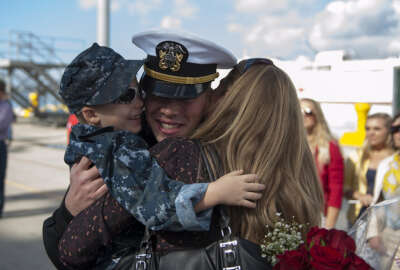
Survey finds military family stressors reflect larger issues DoD is grappling with
Housing, relocation and mental health are all issues the Pentagon is trying to get its arms around. It's also areas where service members are struggling.
Best listening experience is on Chrome, Firefox or Safari. Subscribe to Federal Drive’s daily audio interviews on Apple Podcasts or PodcastOne.
One of the most comprehensive yearly surveys on military personnel finds service members and their families are stressed in key inflection points that the Defense Department is still working to get its hands around.
The 2019 Blue Star Families Lifestyle survey found for the second year in a row that financial issues are the top stressors for military families. Relocation and isolation are high on the stress scale for families as well, ranking second and third.

The survey also, for the first time, took a deep dive into the education of service members’ children, and continued its probe on the reasons and issues behind military spouse unemployment.
“Family life expectations are fundamentally at odds with the unpredictable, and often inflexible, day-to-day military job demands, routine relocations, and many elements of the current defense personnel system,” the survey states. “This year’s survey results continue to illuminate this tension felt by military family respondents as issues related to family stability/quality of life.”
Family stress
Forty-four percent of service members and 49% of spouses who responded to the survey said financial issues were their top concern. Additionally, the inability to reliably earn two incomes was a stressor for 23% of service members and 36% of spouses.
“There’s several reasons for this stress,” Jessica Strong, senior research manager for Blue Star Families, told Federal News Network. “Spouse unemployment and underemployment, that’s a perennial issue. Out-of-pocket housing costs and out-of-pocket relocation costs were the next to top financial stressors”
Relocation stress hit 44% of service members and 46% of spouses, and isolation from family and friends was a top issue for 34% of service members and 44% of spouses.
Read more Defense news
Those top three issues reflect huge areas DoD is struggling with currently. Last February, reports of mice, mold, lead paint and other substandard living conditions in privatized military housing went widespread. DoD is working with Congress and the housing companies to improve the housing situation; however, families have had to live in hotels long term, pay for repairs to houses and seek medical care because of the housing conditions.
Relocation stresses are coming as DoD is trying to award a $2 billion contract that will centralize its household goods delivery, which will pare down the 950 vendors DoD uses to ship service members’ personal items down to just one entity overseeing multiple subcontractors by 2021.
A recent DoD Inspector General report found 41% of shipments made by moving contractors and reviewed by the DoD Inspector General were not delivered on time.
The DoD IG states in the report that due to the untimely shipments, “DoD members and families incurred additional costs for lodging, food, and rental or purchase of household necessities, which may be compensated through an inconvenience claim.”
The issue is so concerning that more than 107,000 people signed a petition to hold moving companies accountable.
“Over the last five years, the permanent change of station season has become more and more horrendous to deal with. The major moving companies awarded the contracts often subcontract out to smaller, local companies,” the authors of the petition state. “These companies also do a poor job in packing and handling of the household goods.”
Finally, the Pentagon is seeing its highest suicide rates since it began tracking numbers. Some experts and military officials think social isolation may be one of the factors for that.
“Military families rely on local friends, family and extended family for support during family separations, during deployments and during trainings,” Strong said. “Even though they rely on that support, we found 39% said they had no one in their local civilian community who they felt they could talk to, and 35% said they had no one they could ask for a favor.”
The Air Force alone lost 137 airmen and civilians to suicide last year.
“Sustaining families and support systems are ALWAYS on the back burner! Most importantly, we need to take accountability for our own mental health and seek behavioral health treatment,” one poster commented on an Air Force forum regarding the deaths. “The Armed Forces will not do it for us.”
After-school activities
The survey took a deep dive into the military education system this year. The survey found 32% of military families lived apart due to their children’s education.
Eleven percent of service members reported they are homeschooling their children and 13% said they had in the past. Reasons for homeschooling included being able to spend more time with family, dissatisfaction with public school options and trying to stabilize a child’s academic experience.
There is good news too. A majority of respondents said their oldest child is thriving in traditional schools, has supportive teachers and has a strong sense of belonging in the school.
A majority of service members also stated they wanted teachers to have training on understanding the impact of frequent moves on their children and how to work with parents to fill educational gaps due to moves.
“This school had a program where a military kid that had been stationed at the school longer would have lunch with the new kid once a week,” a Navy spouse told Blue Star Families. “It helped in the integration process and now she doesn’t need it. It was the first time I saw this program and was impressed.”
Read more Workforce news
Blue Star Families did have recommendations for bettering lives for military children’s school lives.
“One of the areas that needed improvement was allowing children to tryout for sports or extracurriculars regardless of application deadline,” Strong said. “When we ask families ‘What gives your child that sense of belonging?’ the parents said, ‘My kid participates in activities. They can be in karate in Ft. Campbell and also be in karate at Ft. Bragg and they continue to make friends that way.”
Spousal employment
Military spouse employment continues to be a challenge for families. The survey found 24% of spouses were unemployed and 38% were not in the labor force. Military spouse employment also ranked as the most important issue to spouses.
The survey found schedules were a factor in preventing spouses from working.
“Fifty-two percent said the number one barrier is their service member’s day-to-day job demands,” Strong said. “There’s been a lot of talk about how relocation and deployments impact the ability of spouses to, but also our spouses overwhelmingly said it’s their service members’ job demands. It’s not knowing when they have to be at work in the morning, not knowing what time they are going to get off of work and whether you can take the kids to karate.”
Childcare was also a reason.
“Forty-five percent of military spouse respondents who are not working but need/want to work reported childcare costs being too expensive as the reason they were not working compared to only 24% who reported ‘the waitlist is too long’ as the reason they were not working,” the survey states.
Copyright © 2025 Federal News Network. All rights reserved. This website is not intended for users located within the European Economic Area.
Scott Maucione is a defense reporter for Federal News Network and reports on human capital, workforce and the Defense Department at-large.
Follow @smaucioneWFED






